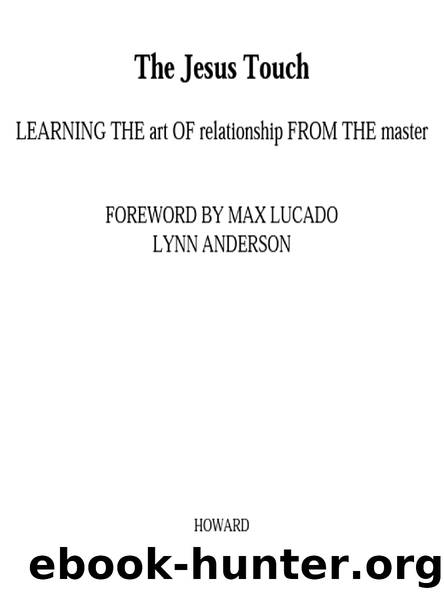The Jesus Touch by LYNN ANDERSON

Author:LYNN ANDERSON
Language: eng
Format: epub
Tags: SOC035000
Publisher: HOWARD
Published: 2002-07-15T00:00:00+00:00
Hooked
Doubtless, a lot of us are susceptible to the alluring and addicting drug of self-pity. It’s the heroin of the emotions. It’s the “angel dust” of the spirit. We may get turned on to it first during a period of adversity coupled with kind friends. The adversity may be sickness—perhaps cancer, a cold, or a broken leg. We may first take the drug to find comfort during a crisis: death, bankruptcy, or divorce. Whatever the cause, the treatment is often the same: Well-meaning friends treat us with pity. They hurt with us. They help us. They weep with us.
And most of the time, this treatment has its intended result. Friends cheer us on. Healing occurs, and we pick ourselves up and continue with life.
Sometimes, however, the sudden flow of love and warmth and kindness feels so good that we keep coming back to the well. And gradually, with time, we become “pity junkies.” Our helpers become enablers. We thrive on the compassion and attention of others. We yearn for someone to notice our plight or ask about our pain. At best our life is reduced to one objective: hunting for comfort and delegating our recovery to others; at worst, we cop out of responsibility and blame someone else for our problems.
Our conversations focus on ourselves: why we are sick, how much it hurts, how harsh the world is to us, why we are losers, and other assorted rationalizations for failure. We blame anyone, everyone, anything but ourselves. We become masters at reciting our woes. We hold out our tin cup to all who pass, begging for a listening ear.
“My boss doesn’t respect me.” “My children don’t appreciate me.” “Society expects too much of me.” Or as my mother used to chide, “Nobody loves me, everybody hates me; I’m going to eat some worms!” Eventually, we end up miserable. We can’t go on without our “attention fix,” yet we don’t like ourselves for needing it. We resent the very people we depend on to give it to us. And the bottom line of it all is anger—at circumstances, at others, and finally at ourselves. The quiet, bitter rage begins to poison every motive and every relationship. We feel unable to function, and we convince ourselves that we cannot. Perspective evaporates. Dreams are swallowed in smoke. Normal feelings of compassion and hope wither. And worst of all, self-respect lies charred among the smoldering embers.
The phrase self-pity embraces the word pit in its bosom. How cryptically symbolic! The pit is the end result of self-pity. A pit big enough for one person and no one else. The air is musty with selfishness, and the walls of narcissism block vision. Do you know someone addicted to self-pity? No doubt, you do. Then no doubt you know they are not easily helped. Partly because it’s difficult, if not impossible, to help someone who wants to stay helpless. And partly because it’s easy to get nauseated on his or her unending recital of personal mishaps and tragedies.
Download
This site does not store any files on its server. We only index and link to content provided by other sites. Please contact the content providers to delete copyright contents if any and email us, we'll remove relevant links or contents immediately.
The 5 Love Languages: The Secret to Love That Lasts by Gary Chapman(9764)
The Space Between by Michelle L. Teichman(6919)
Assassin’s Fate by Robin Hobb(6189)
Wiseguy by Nicholas Pileggi(5755)
Everything Happens for a Reason by Kate Bowler(4724)
Gerald's Game by Stephen King(4628)
Pillow Thoughts by Courtney Peppernell(4264)
A Simplified Life by Emily Ley(4147)
The Power of Positive Thinking by Norman Vincent Peale(4048)
Harry Potter and the Prisoner of Azkaban (Book 3) by J. K. Rowling(3341)
Resisting Happiness by Matthew Kelly(3331)
Girl, Wash Your Face by Rachel Hollis(3272)
Being Aware of Being Aware by Rupert Spira(3263)
The Code Book by Simon Singh(3164)
The Secret Power of Speaking God's Word by Joyce Meyer(3145)
More Language of Letting Go: 366 New Daily Meditations by Melody Beattie(3015)
Real Sex by Lauren F. Winner(3000)
Name Book, The: Over 10,000 Names--Their Meanings, Origins, and Spiritual Significance by Astoria Dorothy(2966)
The Holy Spirit by Billy Graham(2933)
